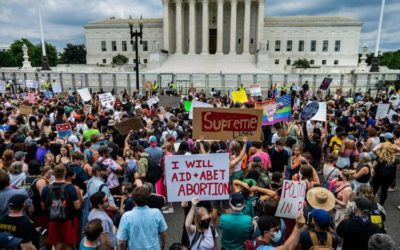Featured on Bloomberg Law – https://news.bloomberglaw.com/us-law-week/innocence-fears-raised-in-high-court-case-claiming-bad-lawyering
Two men sitting on Arizona’s death row say they face execution because they had bad lawyers.
On Wednesday the U.S. Supreme Court will consider whether they’re allowed to prove it.
David Martinez Ramirez and Barry Jones were convicted of murder and sentenced to death in separate state-court cases. Arizona officials say the pair had the chance to raise ineffective-assistance-of-trial-counsel claims in state postconviction proceedings, so they’re bound by the state-court record and can’t develop new evidence on federal habeas review. The defendants point out their state postconviction lawyers were ineffective, too, so federal habeas review is the only way to develop their claims.
How the justices resolve the dispute will determine whether the Sixth Amendment right to counsel is vindicated in cases across the country and, for Jones and others who maintain their innocence, whether people whose guilt is in doubt are incarcerated or even executed.
“It’s easy to get lost in procedure and technicalities but this case is very much about whether innocent people will be able to present evidence of their innocence to a court,” said Imran Syed, co-director of the Michigan Innocence Clinic at the University of Michigan Law School. He’s also amicus-brief committee co-chair for the Innocence Network, which filed a brief in support of Ramirez and Jones.
Bad Lawyers, Outcomes
The case also affects prosecutions where guilt isn’t contested but legal errors still taint the proceedings.
Ramirez’s counsel failed to pursue evidence of his intellectual disability and history of being abused as a child, issues that capital juries consider in weighing aggravating and mitigating factors. He was sentenced to death for the 1989 murders of his girlfriend, Mary Ann Gortarez, and her daughter, Candie. His state postconviction lawyer didn’t address the issues either and the federal district court rejected his habeas petition. But the U.S. Court of Appeals for the Ninth Circuit reversed the district court, ordering the court to allow evidentiary development of his ineffective assistance claim.
In Jones’ case, his counsel failed to probe the state’s police work, medical evidence, and timeline in the 1994 death of four-year-old Rachel Gray. His supporters point to evidence of his innocence. Unlike in Ramirez’s case, a federal district court granted Jones’ habeas petition after holding a hearing. The state appealed and the Ninth Circuit affirmed, so the state had to retry Jones or release him.
Instead, the state challenged the Ninth Circuit rulings for both Ramirez and Jones in a single petition to the justices, which the court granted in May. It takes four justices to grant review but the vote isn’t public. Representing Ramirez and Jones at Wednesday’s argument in Washington is Orrick’s Robert Loeb, a partner in the firm’s Supreme Court and appellate practice.
They’re also backed by amicus briefs spanning a range of groups including former judges, who say the hallmark of the justice system is that defendants “must have at least one full and fair opportunity to litigate their constitutional claims.”
Arizona’s supporters include a coalition of states, led by Texas, which asserts a “substantial interest in ensuring that federal courts respect the comity, finality, and federalism interests that animate AEDPA,” referring to the federal law at issue, the Antiterrorism and Effective Death Penalty Act.
Precedent v. Statute
Signed into law in 1996 by Bill Clinton, AEDPA bars habeas hearings if a defendant “has failed to develop the factual basis of a claim in State court proceedings.” In 2012, the Supreme Court in Martinez v. Ryan carved out an AEDPA exception. The court said failing to raise ineffective trial counsel claims is excused if state postconviction counsel was ineffective, too. It was a 7-2 decision by then-Justice Anthony Kennedy, joined by Chief Justice John Roberts and Justices Samuel Alito, Stephen Breyer, Sonia Sotomayor, Elena Kagan, and the late Justice Ruth Bader Ginsburg. Justice Clarence Thomas joined the late Justice Antonin Scalia’s dissent.
“Martinez is a really important recognition of a critical right,” Syed said. “If the state of Arizona was to prevail, there would be a substantial gutting of that right and it would affect many defendants including innocent people who won’t be able to make their case,” he said.
Valena Beety, an Arizona State University law professor who’s among the scholars on an amicus brief backing Ramirez and Jones, said AEDPA is already a restrictive law and that a ruling for the state “would shut the opening that Martinez made for a bit of equity.” Limiting habeas review to a record that’s faulty because of ineffective counsel “doesn’t make any sense,” she said.
But Arizona and its backers say the Ninth Circuit went beyond Martinez. The appeals court rulings for Ramirez and Jones “expand Martinez’s narrow procedural-default exception to swallow the evidentiary limitations” of AEDPA, Arizona Attorney General Mark Brnovich’s office said in its brief to the justices. The office didn’t respond to multiple requests for comment on the case.
An amicus brief backing Arizona goes further than the state, urging the justices to scrap Martinez altogether. AEDPA “should have ended this case long ago,” said the brief from Adam Mortara and Jonathan Mitchell, the former Texas solicitor general who is credited with the idea for the state’s six-week abortion ban that’s enforced by private parties and is awaiting high-court decision. “Ramirez cannot obtain relief here because his application depends on demonstrating that his post-conviction counsel was ineffective,” the brief said. But Martinez “precludes that straightforward result,” it said, criticizing the 2012 precedent’s reasoning.
Asked which justices might be inclined to overturn Martinez, Mortara, a former Thomas clerk, said “several of the justices on the Court today have never passed on Martinez’s correctness as an initial matter,” and that he “would think all of the justices interested in good statutory interpretation would be open to correcting this mistake.”
The case is Shinn v. Ramirez and Jones, U.S., No. 20-1009.



